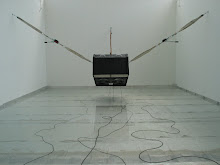Sentences on Art Criticism
Criticism is swimming endless lengths, thinking
In 1969, Sol Lewitt published his now famous tract, ‘Sentences on Conceptual Art’. I often return to these sentences, because they encapsulate everything the critic is not.
Lewitt: “Conceptual artists are mystics rather than rationalists. They leap to conclusions that logic cannot reach.”
Me: Art critics are rationalists not mystics. They do not leap.
Lewitt: “Rational judgements repeat rational judgements.”
Me: Rational judgements repeat rational judgements. This is why we have come to despise criticism.
Lewitt: “Irrational judgements lead to new experience.”
Me: The critic rarely braves irrationality.
And so on…
In the spirit of Lewitt’s ‘Sentences on Conceptual Art’, I would like to propose my own, self-styled ‘Sentences on Art Criticism’:
1. Criticism is not a constitutional right; freedom of speech is.
2. Criticism is not an entitlement – it is a response.
3. Criticism does not arrive dressed in a bow tie or pressed suit.
4. Criticism is misunderstood. The role of criticism is overstated and undervalued. This can be the source of productive tensions for the writer, or simply induce depression.
5. Criticism can be a sharp blade, Occam’s razor. Mostly, though, we are made to believe that criticism is a traditional weapon – a gnarled knobkerrie, perhaps.
6. Criticism is not a period or a full stop; it is not the end of a sentence, statement, thought or idea. In this regard, read Ian Buruma’s The Wages of Guilt (1994): “To catch truth there must be conflict, debate, interpretation, and reinterpretation – in short, a discourse without end.”
7. Criticism is a love letter to someone you don’t know.
8. Criticism is reading other critics.
9. Criticism is Simon Njami consciously setting himself up for failure when he travelled to Senegal to interview the filmmaker Djibril Diop Mambety about photography.
10. Criticism is not a liturgy: it need not be churchly or have a spiritual purpose; laughter is allowed.
11. Criticism is reverence.
12. Criticism is, as JG Ballard said of science fiction, “wholeheartedly speculative”.
13. Criticism is a position; it has no true north.
14. Criticism is Jean-Loup Pivin writing in the editorial to the launch issue of Revue Noire: “Revue Noire should be savoured on a shady terrace like a glass of ginger.” In other words, criticism is the rattle of ice in a glass on a hot day.
15. Criticism in not ventriloquism: it cannot make a thing or an experience speak for itself.
16. Criticism is not the noose that hangs the thought. If the thought’s dead already… the critic merely operates as an obituarist.
17. Criticism is a contest, a Rumble in the Jumble: Ali is the verb, George Foreman the adjective.
18. Criticism is a clutch of spurious synonyms: bad press, brickbats, censure, critical remarks, disapproval, disparagement, fault-finding, flak, knocking, panning, slam, slating, stricture
19. Criticism can also offer analysis, appraisal, appreciation, assessment, comment, commentary, critique, elucidation, evaluation, judgement… a notice, a review.
20. Criticism is the sweat in the palm of your hand when an annoyed artist, piqued by a review, demands: “What right do you have to shit in my garden?”
21. Criticism is Gore Vidal, floored by Norman Mailer’s punch, retorting: “Norman Mailer, at a loss for words again!”
22. Criticism is the startling sound of thunder.
23. Criticism wants to be a veld fire. Typically, however, it is a stompie jettisoned from a car window.
24. Criticism is responsibility. In this, it is an ethical pursuit, for as the unpopular poet Ezra Pound reminds: “Fundamental accuracy of statement is the one sole morality of writing.”
25. Criticism is journalism.
26. Criticism is for sale.
27. Criticism has no section in Exclusive Books.
28. Criticism is the lightning bolt that flashes in the pages of The War Against Cliché (2000). In the foreword, Martin Amis offers: “Enjoying being insulting is a youthful corruption of power. You lose your taste when you realise how hard people try, how much they mind, how long they remember.”
29. Criticism is literature.
30. Criticism is always remaining fascinated, intrigued and obliquely curious. Otherwise you’re just news gathering. In this, criticism implies a partisan spirit.
31. Criticism is not collaboration.
32. Criticism is a retreat into silence. It demands knowing when to simply look with the eyes, laugh with the mind, and bite the tongue.
33. Criticism is none of the above. These are merely sentences on art criticism.



2 Comments:
so criticism isn't a monster after all...
A year from now I'll probably disagree with much what I wrote here.
Post a Comment
Subscribe to Post Comments [Atom]
<< Home